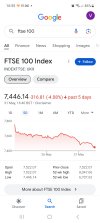I was saying this last July, the low risk investments with ISA, AVCs etc dropped a lot more than the higher risk one, due to the former having much more bonds.
The Guardian article is acting like it is a warning, but the horse has well and truly bolted.
Depends what you plan to do with it? I’d more like inclined to look at a gold ETF. I don’t know if you’re familiar with ETF’s - If not, it’s an Exchange Traded Fund, so is basically like buying gold on the stock market as you would when you purchase shares. I imagine an ETF to be more convenient...

forums.bluemoon-mcfc.co.uk

forums.bluemoon-mcfc.co.uk



